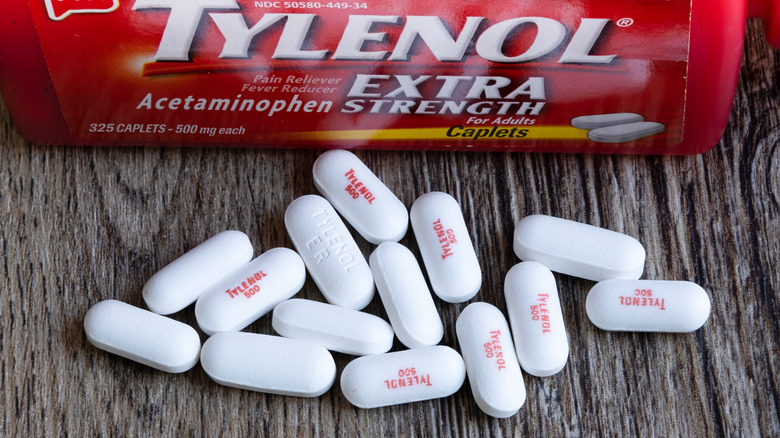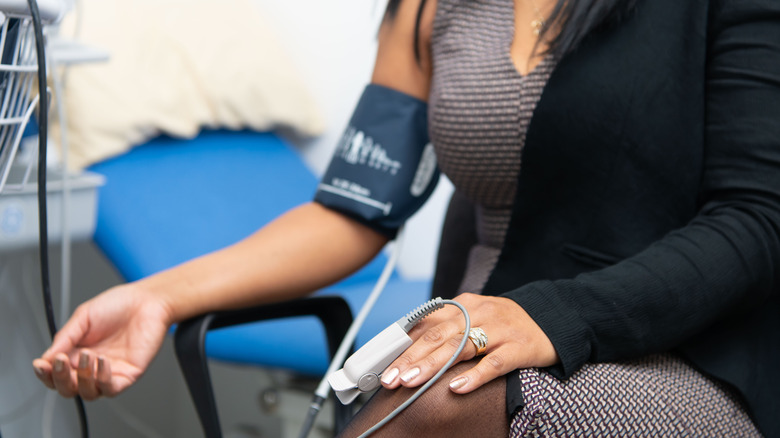Popular Medications With Dangerous Side Effects
Medications can do many things, from relieving a fever or clearing bacterial infections to thinning your blood or perking up your mood. Doctors prescribe drugs using strict protocols to make their use as safe as possible (via American Family Physician). The Food and Drug Administration (FDA) is responsible for making sure that drugs work, and that they're safe to take. Still, medications can come with a range of side effects.
To be safe, ask your doctor about side effects when they prescribe your medication. You can also ask a pharmacist when you receive your drugs, and read about the side effects on the label that comes with your medication. The side effects of certain drugs are significantly more dangerous when they're used improperly. The FDA cautions against stopping medicine too early or without your doctor's advice. You should take medications exactly as prescribed. Some drugs require specific timing, such taking the medication with food, and all require specific doses.
Following the instructions of your prescription should keep you safe and allow the medicine to do its job. If you experience side effects, you should contact your doctor or another healthcare professional. Some side effects are serious enough that you might need emergency medical care. Let's dig into some common medications that can cause serious side effects.
Fentanyl
Sometimes a surgery or injury leaves you in an overwhelming amount of pain. A class of drugs called opioids are often prescribed to relieve pain, and they're quite effective. According to the National Institute on Drug Abuse, fentanyl is a powerful, man-made opioid that's used for intense pain. If other drugs aren't doing the job, a medical professional might prescribe fentanyl. It's between 50 to 100 times more powerful than morphine.
Fentanyl overdoses make up the largest number of overdoses from opioids in the United States. That's not simply due to their potency. Fentanyl is being made and sold illegally, which contributes to the increasing number of overdoses.
Even when taken as prescribed, fentanyl can be addictive and comes with side effects. It can make you confused, constipated, tired, and make breathing difficult. Some people stop taking fentanyl because of those side effects. Withdrawal is also a concern after you stop taking fentanyl. You can develop pains, problems sleeping, diarrhea, cravings, and leg spasms. For that reason, your doctor might prescribe other medications to ease your transition off of fentanyl.
Oxycodone
Oxycodone is an opiate, according to MedlinePlus, and helps relieve pain. It comes in variety of different forms, such as capsules and liquids. There's a regular form and a long-lasting form of oxycodone. Sometimes it's combined with pain relievers you can find over-the-counter, such as aspirin.
Typically, your doctor will start you off with a lower dose of oxycodone. If you're still in pain, they'll slowly increase the dose. You'll have to tell your doctor what other medications and supplements you're taking, so that they can make sure it's safe for you. Drinking alcohol and taking other illegal or prescription drugs without your doctor's knowledge can be very dangerous while you're taking oxycodone.
Some of the possible side effects of oxycodone include stomach pain and headaches. More severe side effects include hallucinations and abnormal heart rhythms. You can also have seizures or become very tired, which makes it dangerous to drive or operate machinery. Overdose and addiction are both possible on this drug. Some signs of an overdose include slow breathing, weakness, or being extremely sleepy.
Sertraline
The most popular brand name of sertraline is Zoloft, which is a drug that's used for the treatment of depression and obsessive compulsive behavior, says the Cleveland Clinic. As you begin taking this medication, your doctor will watch you closely. They'll be looking to see if your symptoms improve or not. Some people experience worse depressive symptoms and thoughts of suicide while on the drug.
You shouldn't drink alcohol while taking sertraline, because alcohol can mitigate the medication's effects. You should also let your doctor know if you smoke or take prescription or illegal drugs, since they can cause dangerous interactions or side effects.
Some people feel lightheaded, dizzy, and have irregular heart rhythms while they take sertraline. You might get dizzy if you stand up too quickly. It's possible to have problems with your vision as well, and even seizures. Less serious but still concerning side effects include a loss of sex drive, change in body weight, and tremors.
Paroxetine
Paroxetine is used to treat depression, but it can also help with anxiety and panic disorders, as well as post traumatic stress and premenstrual dysphoric disorder, according to the Cleveland Clinic. If you start to have problems while on paroxetine, contact your doctor before you do anything. Continue to take your drug at the regular times you were prescribed, because stopping it suddenly can make side effects worse. Your doctor can walk you through how to stop taking the drug.
If symptoms of depression get worse or you develop suicidal thoughts as you start to take paroxetine, contact your doctor. You might also have worsening symptoms of anxiety. This medication makes you drowsy, so don't drink alcohol while you're taking it. Some other side effects of paroxetine include stiffening muscles, problems sleeping, feeling tired or agitated, and feeling confused. Some people have an allergic reaction to the drug, which manifests as swelling in the face and skin rash. It's also possible to overdose on this medication if you take it improperly, and if you feel like you're having an overdose, you should seek emergency help.
Ambien
Sometimes you might lie awake at night and want to sleep so badly but can't seem to drift off. If this happens too often you can become sleep deprived. Ambien is a cure for insomnia, and is one of the most common sleep medications on the market, according to the American Addiction Centers. Ambien essentially helps to calms your brain, allowing you to fall asleep (via Penn Medicine). It's useful for people who can't seem to wind down at night.
There are both mental and physical side effects you can have from taking Ambien, per American Addiction Centers. Mentally, you might feel foggy and have trouble concentrating during the day. Your memory can worsen, and you can have depressive symptoms. Physically, you can become dazed and slower in your movements. You might also feel dizzy and unstable on your feet. When you take Ambien, you should be prepared to sleep afterward. Don't take it before you need to do any type of physical activity. Sleepwalking is another side effect of Ambien. Some people might even eat, drive, or have sex while sleeping, but have no knowledge of what they've done the next day.
Alprazolam
The drug alprazolam is known under its popular brand name, Xanax. It's part of a drug family called benzodiazepines, which calm you down and treat problems like anxiety and panic disorder, according to MedlinePlus. Alprazolam is also used to treat depression and fear of open spaces. Taking this medication can make you tired, so be careful if you're going to drive or operate heavy machinery. It can also make you irritable and cause dizziness. Some people experience changes in appetite and weight while taking alprazolam.
There are some more serious side effects of alprazolam. These include problems speaking and doing basic movements like walking. Seizures and trouble breathing are also possible. Taking alprazolam with opiates can be problematic and lead to other serious side effects, such as coma, so it's important to tell your doctor what other drugs you're taking. Alprazolam may also cause physical dependency or withdrawal symptoms that could last for weeks or months, especially if someone stops taking the drug suddenly.
Flexeril
Muscle relaxers are a type of drug that can help with musculoskeletal problems such as neck pain, lower back pain, and headaches, according to an article published in American Family Physician. According to the authors, previous research has shown most muscle relaxers can cause dizziness and drowsiness, but some had more serious side effects. Flexeril is the most-studied muscle relaxer, and it can cause heart arrhythmias and seizures. In some extreme cases, it can even cause heart attacks.
It should be noted that there are certain medications you should not take while you're on Flexeril. One example is tramadol, which can increase a patient's risk of seizures when taken in combination with Flexeril. People who have a history of heart problems should be careful while taking this drug, since they're at the highest risk for developing heart-related side effects. The researchers point out that taking 5 milligrams of Flexeril is just as effective as taking 10 milligrams, but it reduces the risk of side effects.
Adderall
Intended for use as a drug to treat attention deficit hyperactivity disorder (ADHD), Adderall has unfortunately become a widely abused prescription drug, according to the American Addiction Centers. Some people use it for weight loss, to boost their ability to study, or to keep themselves alert while they're out late at night. These aren't proper uses for Adderall, and can result it harmful side effects. For example, drinking while taking Adderall is dangerous, as the drug can dampen the effects of alcohol and lead someone to drink more than they should, potentially resulting in alcohol poisoning.
Even when taken properly, Adderall can cause serious side effects such as kidney problems and heart problems. Adderall can raise your blood pressure, cause irregular heart rhythms, and even lead to heart attack or stroke, especially when taken improperly or over a long period of time. Withdrawal from Adderall can also cause problems, including anxiety, depression, or panic attacks.
Prozac
Prozac, which is the brand name for fluoxetine, is a drug that treats symptoms of depression and obsessive-compulsive disorder. It's also sometimes used to treat issues like body dysmorphia and the eating disorder bulimia, according to the National Alliance on Mental Illness. There are some milder side effects that decrease soon after you start taking the drug, including restlessness and trouble sleeping. Some problems, like problems reaching an orgasm, might not go away.
There are more serious side effects of fluoxetine use, such as low sodium levels. This can lead to weakness and difficulty concentrating. You're also at risk for developing serotonin syndrome of you take this medication. Fluoxetine is a selective serotonin reuptake inhibitor (SRRI) drug, which can lead to too much serotonin in your system. Serotonin syndrome can be a serious problem with symptoms ranging from shivering to seizures and even death. Fluoxetine can also increase your risk for bleeding, which can be dangerous if taken along with anti-inflammatory or blood-thinning medication.
Ritalin
In children, Ritalin can promote calmness and attentiveness, according to Alberta Health Services. In adults, it can increase energy and attention. Ritalin is primarily used to treat attention deficit hyperactivity disorder (ADHD), but can be used for narcolepsy. Similar to Adderall, Ritalin is sometimes abused and misused in places like colleges because students think it will help them concentrate. Milder side effects of Ritalin include jitteriness, an inability to sleep, and a fast heartbeat.
If you take too much Ritalin, you can experience seizures and changes to your normal heart rhythm can lead to coma or death. Psychological problems are also possible. Some people feel paranoid when they have too much Ritalin, and can hallucinate. In some cases, these effects go away slowly or not at all. Dependency and tolerance are two major problems with Ritalin. People who take it too much or for too long can become dependent on it and have trouble stopping. Some people also stop feeling the drug's effects and need take more to try to achieve the same results.
Warfarin
People with blood clots or clotting disorders might be prescribed warfarin, according to the American Heart Association. It works by disrupting the formation of bodily substances known as clotting factors, which in turn prevents them from forming clots. While blood clotting is important to stop bleeding, it can cause serious problems such as heart attack and stroke. Warfarin can relieve blood clots in the arteries that prevent blood from flowing to the heart, brain, and lungs.
What makes warfarin useful is the same thing that makes it dangerous. People on warfarin don't develop blood clots as easily, and are therefore more susceptible to bleeding. Some of the side effects of warfarin include bleeding gums, blood in urine, blood in stool, and vomiting blood. Bleeding internally — such as in the brain or abdomen — can be very dangerous. Taking warfarin properly is very important to avoid bleeding events. Those on warfarin should also avoid risky activities that can cause trauma or cuts, and should use everyday sharp items like razors or knives with added caution.
Acetaminophen
Not all medications require a prescription. In fact, a popular drug used for pain and fever relief, acetaminophen, is available in most pharmacies (via MedlinePlus). Since it's available without a prescription, it's easy to assume that acetaminophen isn't dangerous. However, taking too much of this drug can cause serious side effects.
Some people have allergic reactions to acetaminophen, says the American Addiction Centers. Symptoms of a reaction include swelling on the face or mouth, including in the throat. You can also have trouble breathing. Taking too much acetaminophen can lead to liver problems. Symptoms of liver damage include abdominal pain, fatigue, and dark circles under your eyes.
Following the dosing information on acetaminophen can help you avoid problems. As long as you take it properly, you shouldn't have significant side effects. However, it's possible to unintentionally take more acetaminophen than you realize, because it's the active ingredient is in many cold and flu medications. Read the labels on the medicines you buy carefully to see how much of the drug you're consuming at once. You shouldn't take more than 1,000 milligrams at once or 4,000 in 24 hours, according to the American Addiction Centers.
Terazosin
High blood pressure can be a serious medical issue and put you at risk for developing cardiovascular disease (via Mayo Clinic). Terazosin is a medication that can help reduce blood pressure and bring it back to normal levels, according to MedlinePlus. It's also used to treat an enlarged prostate in men, which can help with things like urination.
When you take terazosin, you might feel weak or tired. Some people notice back pain and weight gain as side effects. You can also have a decrease in sexual ability. An allergic reaction is possible, which can result in hives and itching. Your heart can also start to beat abnormally and pound in your chest, which can be concerning. Men might notice that they have erections that last long and are painful. Terazosin can also make you sleepy, so don't do anything that requires quick reactions or handle dangerous equipment when you're taking it. You should also know that it can make you dizzy, particularly if you stand up quickly. To avoid fainting, stand up or sit up slowly to let your body adjust. People 65 and over are advised against taking this medicine, because there are safer alternatives.
Rivaroxaban
Rivaroxaban is a blood thinner that's used to treat or prevent clots in the lungs and veins in particular, says the Cleveland Clinic. People with atrial fibrillation — an condition in which one's heartbeat is irregular, possibly leading to a host of other health problems — can also use this drug to reduce their risk of stroke. There are many drug interactions that your doctor will consider when prescribing this medication. Let them know if you take any over-the-counter painkillers such as aspirin or Tylenol, since these can cause problems when combined with rivaroxaban.
You can develop excess bleeding while taking this medication. For that reason, it's best to avoid activities that could cause trauma or bleeding — so, things like contact sports are probably out, and people on this drug should be careful when using sharp objects like scissors or knives. If you stop taking this drug too abruptly, you can develop blood clots. Other side effects from this medication include peeling and blistering in the mouth or on the skin.














